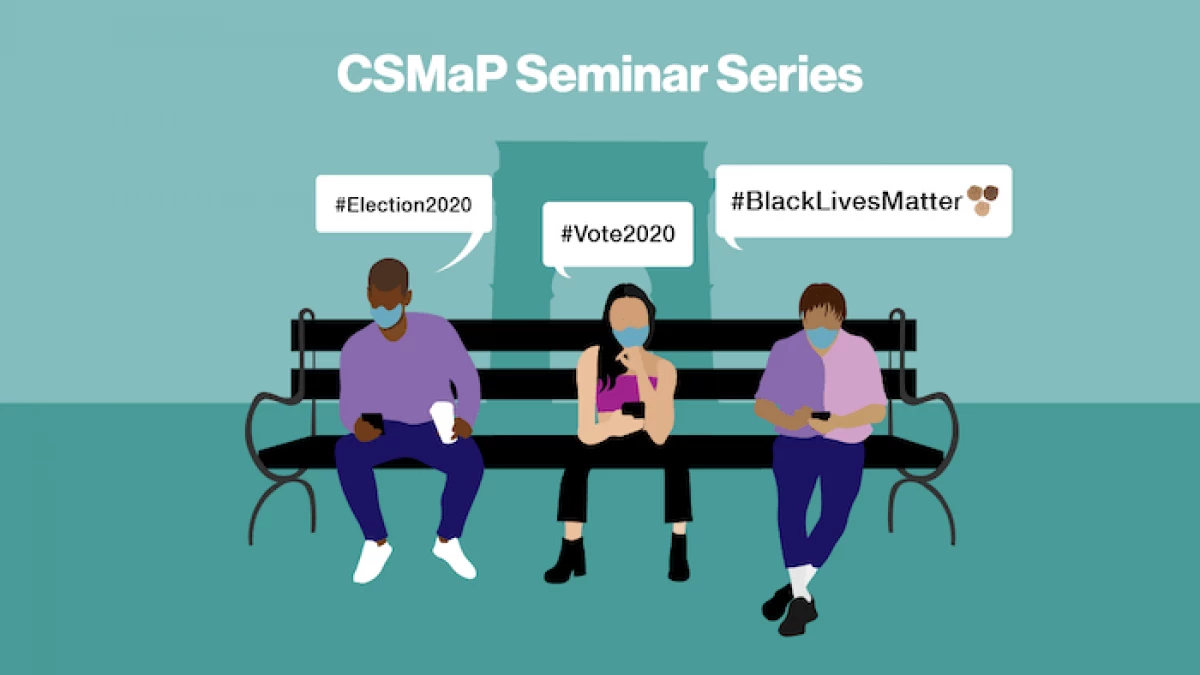CSMaP Election Seminar Series: Fall 2020
In Fall 2020, NYU's Center for Social Media and Politics brought together leading scholars to explore the relationship between new media technologies and democratic politics. Our virtual CSMaP Seminar Series highlighted the latest research and identified future research we need in the lead-up to and aftermath of the November elections.

Credit: Judy Zhang
Fall 2020, the NYU Center for Social Media and Politics brought together leading scholars to explore the relationship between new media technologies and democratic politics. Our virtual CSMaP Seminar Series highlighted the latest research and identified future research we need in the lead-up to and aftermath of the November elections.
Speakers explored the following questions:
How does information spread through online networks, and what can we do to mitigate the harmful effects of misinformation?
How do digital technologies affect political participation, from protests to campaigning to voting?
How does social media fit into people’s broader media diets?
How have electoral interference strategies evolved since 2016, and what impact do they have on voters’ beliefs and behaviors?
How have political elites responded to this new information environment?
Moving Closer or Further Apart: Social Media, Polarization, and the 2020 Election
Friday, October 30 | 12:00 - 1:00 pm ET | 9:00 - 10:00 am PT
Journalists and pundits have described political polarization as one of the foremost problems of our time. It has been ascribed to trends such as changing party compositions, racial and ethnic divisions, and the rise of partisan cable news. This seminar will present new research on social media and political polarization in both the United States and Bosnia and Herzegovina, with a focus on tactics that could mitigate the effects of polarization. These include examining the effects of 1) news consumers deactivating Facebook and 2) introducing a common enemy to reduce conflict between members of rival political groups. This event is open to the public, but registration is required.
Panelists
Chris Bail is a professor of sociology and public policy at Duke University, where he directs The Polarization Lab. He studies political tribalism, extremism, and social psychology using data from social media and tools from the emerging field of computational social science. He has been a Guggenheim Fellow and a Carnegie Fellow. His research appears in leading journals, such as the Proceedings of the National Academy of Sciences, Science Advances, the American Journal of Public Health, and the American Sociological Review.
Hunt Allcott is an applied microeconomist who studies topics in behavioral economics, environmental economics, public economics, and industrial organization. He is a senior principal researcher at Microsoft Research, a visiting associate professor of economics at Harvard University, a research associate at the National Bureau of Economic Research, and a co-editor of the Journal of Public Economics. He was a contributing author on the Fifth Assessment Report of the Intergovernmental Panel on Climate Change.
Nejla Asimovic is a Ph.D. candidate in the Department of Politics at New York University and a research associate at CSMaP. She studies group dynamics in post-conflict contexts and areas of deep societal divisions, with a focus on the role social media plays in negotiating identities and shaping levels of affective polarization.
The panel was moderated by Zeve Sanderson, executive director of CSMaP.
Panel Recordings
Friday, October 30 | Moving Closer or Further Apart? Social Media, Polarization, and the 2020 Election
Nejla Asimovic (NYU), Hunt Alcott (NYU), Christopher Bail (Duke)
10/30 Panel Recording
(Day 3 Access Code: TykB8%7.)
Friday, October 16 | Misinformation and Its Corrections: Misinformation and Corrections During a Pandemic and Presidential Election
Leticia Bode (Georgetown), Emily Thorson (Syracuse), Andy Guess (Princeton)
10/16 Panel Recording
(Day 2 Access Code: P?Ys315g)
Friday, October 2 | Networked Dissent: Social Media & Protest Participation
Deen Freelon (University of North Carolina at Chapel Hill), Jennifer Pan (Stanford University), Alexandra Siegel (University of Colorado Boulder)
10/2 Panel Recording
(Day 1 Access Code: zf5xv1.#)